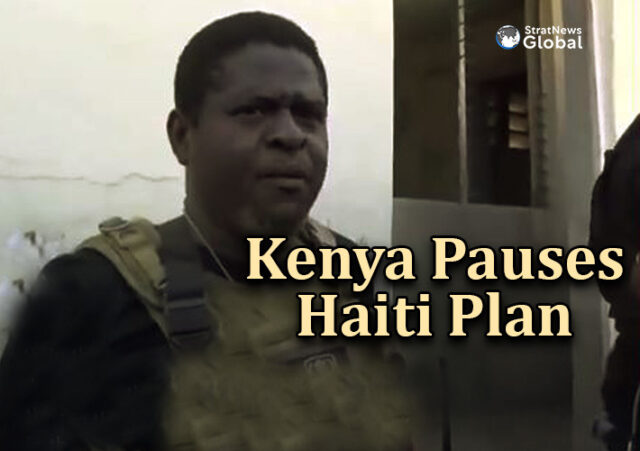Kenya has paused its plans to deploy police officers to Haiti due to the recent surge in violence and a significant shift in Haitian leadership.
In October 2023, Kenya agreed to lead a UN-sanctioned international police force to help stabilize Haiti, which has been plagued by gang violence for years. However, Kenya’s top court ruled against the deployment in January 2024, citing a lack of formal agreements between the two countries.
This hurdle was seemingly overcome in early March when Kenyan President William Ruto and Haitian Prime Minister Ariel Henry signed the necessary agreements. The deployment aimed to quell the escalating gang violence that had intensified since late February, with attacks on police stations, prisons, and the main airport.
However, Prime Minister Henry’s announcement on March 12th to resign upon the formation of a transitional council has complicated matters. Kenyan officials, citing the lack of a stable government in Haiti, have decided to delay the deployment until a new administration is established.
This decision comes despite Kenyan Interior Minister Kindiki Kithure confirming on March 11th that officers were prepared for deployment once the legal requirements were met.
“It is true the planned deployment of police officers has been put on hold,” Kenya’s Foreign Affairs Principal Secretary Koriri Sing’oei said Tuesday, adding: “There has been a fundamental change in circumstances in Haiti as a result of the complete breakdown of law and order.
“What has happened over the last few hours presents a change in circumstances, because there is no administration on which to anchor a deployment. So as such we would have to wait and see what kind of administration is going to be installed in Haiti,” he said.
The situation in Haiti, where armed gangs led by former cop-turned ganglord Jimmy ‘Barbecue’ Cherizier have been attacking government officials and installations and terrorising citizens, remains precarious. Prime Minister Henry, appointed after the assassination of President Jovenel Moïse in July 2021, faced criticism for lacking a popular mandate as he was not elected by the people or parliament. Haiti’s parliament has also been non-functional since January 2023, leaving the country with no elected officials.
On Wednesday, the U.S. Southern Command announced that U.S. Marine Fleet-Anti-terrorism Security Team (FAST) ha been deployed “to maintain strong security capabilities” at the American Embassy in the capital Port-au-Prince.
Statement: U.S. Marine Fleet-Anti-terrorism Security Team (FAST) deployed to maintain strong security capabilities at the U.S. Embassy in Port-au-Prince, Haiti. @USEmbassyHaitihttps://t.co/nKfIW6e7ZQ
— U.S. Southern Command (@Southcom) March 13, 2024
At an emergency conference on the crisis in Haiti held in Kingston, Jamaica, on Monday, US Secretary of State Antony Blinken offered $33 million in immediate humanitarian assistance and pledged another $100 million for an international stabilization force, bringing the total promised by the United States to $300 million since the crisis intensified several years ago. Escalating violence “creates an untenable situation for the Haitian people, and we all know that urgent action is needed on both the political and security tracks,” he said.
.@SecBlinken on political transition in Haiti: “None of this is easy…but at least there is a plan, a process in place to do that. It’s Haitian designed. It’s Haitian lead, but it’s supported by many countries, not only in this hemisphere, but around the world.” pic.twitter.com/6qyXmZQrJM
— CSPAN (@cspan) March 13, 2024
Kenya’s decision reflects the need for a clear and stable Haitian government to partner with on such a critical security mission.
Also See:
In a career spanning three decades and counting, Ramananda (Ram to his friends) has been the foreign editor of The Telegraph, Outlook Magazine and the New Indian Express. He helped set up rediff.com’s editorial operations in San Jose and New York, helmed sify.com, and was the founder editor of India.com.
His work has featured in national and international publications like the Al Jazeera Centre for Studies, Global Times and Ashahi Shimbun. But his one constant over all these years, he says, has been the attempt to understand rising India’s place in the world.
He can rustle up a mean salad, his oil-less pepper chicken is to die for, and all it takes is some beer and rhythm and blues to rock his soul.
Talk to him about foreign and strategic affairs, media, South Asia, China, and of course India.





